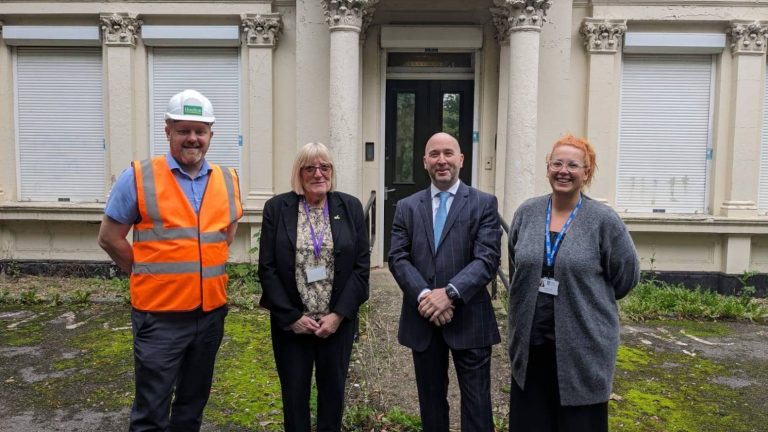Hull contractor poised to start work on assisted living centre
Yorkshire’s coastal businesses offered advice to boost firms’ digital dimension
Business leaders’ voice will be heard at York & North Yorkshire Business Summit
Plant supplier signs six-figure deal to supply CATCH with welding equipment
Yorkshire Water’s £7.8bn investment will increase bills for consumers
- £3.1bn investment will drive efforts to deliver secure, safe clean water supplies with improved resilience of its network of pipes and a focus on future water resource needs.
- £4.3bn will support plans for a healthy, natural environment, with a focus on protecting and improving river and coastal water quality, to create a cleaner, safer water environment.
- The plan outlines investment in customer service and an increase in support available to customers with an investment of £446m.
- This includes financial support for half a million (500,000) customers, direct help with water bills for 280,000 customers and £250m worth of financial support across the five years.
- The plan will support employment for more than 10,000 people across Yorkshire.
- £2.4bn investment to improve supply resilience through increased mains replacement and refurbishment of critical storage and treatment assets
- £461m to secure future water resources and upgrade water meters to smart meters to give greater and more timely information on usage
- £95m to maintain safe, clean water supplies
- £83m to enhance collaboration with landowners and stakeholders to improve land management including sites of special scientific interest (SSSI) for the benefit of the environment and improve raw water quality
- £1.9bn to reduce the use of storm overflows and to protect the environment
- £1.8bn to maintain and improve wastewater collection and treatment, including monitoring systems to improve Yorkshire Water’s impact on the natural environment, including reducing Phosphorus, microplastics and unwanted chemicals entering watercourses, and investigating where environmental investments will be required in the future.
- £347m to ensure Yorkshire Water’s bioresources facilities continue to deliver and have sufficient capacity for the future
- £155m to reduce air emissions and ensuring Yorkshire Water’s infrastructure meets the need of a growing population and new developments
- £51m will be invested in measures to reduce greenhouse gas emissions
- £26m allocated to continue work in Hull and the East Riding to tackle flooding issues in the area through Living With Water – a partnership with the Environment Agency, Hull City Council, East Riding of Yorkshire Council and the University of Hull.
Creative agency moves to make space for growing team
Hull-based creative communications agency Pace has moved to new larger offices to accommodate its growing team.
The agency is now based at Warehouse 6 in Princes Dock Street in the city centre. Following a number of key appointments, Pace outgrew its Fruit Market base and has moved to the renovated warehouse. It is Pace’s fourth move in eight years. MD Anita Pace said: “We’re now a team of 28 and we needed more space. This move is significant because it represents continued investment in our future growth. “Our new office will foster more creativity within Team Pace thanks to the purpose-built spaces we have designed including our new state-of-the-art production studio. “I strongly believe that we create our best work when we collaborate in person, face-to-face, and our new home at Warehouse 6 will give us better opportunities to do this both as a team and with our clients.” Warehouse 6, formerly a dock warehouse serving Princes Dock, was built in 1850 and the building still retains many original features. Pace’s new office will overlook the new Murdoch’s Connection footbridge and is close to the marina, Fruit Market and the city centre.Be cautious over wage rises, Government is told by British Chambers of Commerce
- On the Secretary of State for Business and Trade’s comments about Brexit and trade issues, William Bain, Head of Trade, said: “Boosting exports is key to the UK’s future economic prosperity, but firms of all sizes are facing a wide range of stumbling blocks. These include inflationary pressures, a restructuring of global supply chains and the continuing flow of new requirements from the EU trading relationship.
Planning approval secured for development next to Salts Mill World Heritage Site in Saltaire
Proposals to demolish a vacant office complex on the edge of the Salts Mill World Heritage Site in Saltaire, Shipley and replace it with a sustainable residential quarter and riverside park have been given the go-ahead by Bradford Council.
Urban regeneration specialist Artisan Real Estate will now progress with its ‘transformational’ redevelopment of the 11-acre site, sandwiched between the River Aire and the Leeds & Liverpool Canal, which was formerly home to an HMRC office block that closed in October 2021.
Artisan’s plans for the new ‘Saltaire Riverside’ development include the provision of 289 new homes, more than 5,000 sq ft of commercial office space designed for flexible working and a café facing on to a new ‘pocket’ park and piazza.
A sizeable riverside park will seamlessly link the development to the River Aire, providing woodland, grasslands and lawns to act as a natural flood water storage area whilst pedestrian links will provide direct access to Saltaire Rail Station and the canal towpath.
Welcoming the planning approval, James Bulmer, development director for Leeds-based Artisan North, said: “We are naturally delighted that our transformational vision for this vacant site next to an UNESCO world heritage site is now set to become a reality.
“This is a hugely exciting development that will spectacularly open up a large riverside area that has effectively been closed to the public since the 1970s when the HMRC complex was built. Our proposals will bring interest and investment to the area and provide a natural, contemporary extension to the existing Saltaire footprint.
“Our completed development will become a modern interpretation of the neighbouring Saltaire village, bringing much needed sustainable family housing in an accessible, well connected and environmentally responsible setting.”
He added: “Progressing such a large development on the very edge of a UNESCO World Heritage site brings its own set of challenges and responsibilities, and we have taken time to understand and reflect the unique historical contexts of the Salts Mill location.
“Our final proposal, developed in partnership with Yorkshire-based architects Axis Architecture, is the result of a more than 18-months of design and architectural planning.
“This has been supported by a comprehensive and broadly very positive public consultation programme – including two design workshops with local stakeholders and three major public events.”
Artisan’s scheme will demolish the existing seven-storey HMRC building which consists of two large hexagonal office blocks, with a construction start on site forecast for early 2024.
Prior to the HMRC development, the Saltaire Riverside was used as occasional storage shed area, allotments and grazing land for canal ponies.
Saltaire Village is named after Sir Titus Salt who built a textile mill known as Salts Mill and the supporting village overlooking the River Aire in the second half of the 19th century. Designed by architects, Lockwood and Mawson, Saltaire followed in the footsteps of other model settlements in providing a relatively healthy environment for workers to reside and work.
Saltaire has Italianate architecture and a rich history and was designated a World Heritage Site by UNESCO in 2001. The village is considered an outstanding example of mid-19th century philanthropic paternalism and had a profound influence on developments in industrial social welfare and urban planning in the United Kingdom and beyond.

It’s green for go as Wellspring launches fund-raising initiative
Food ingredients supplier secures $55m financing deal
Coca-Cola Europacific Partners to make £31m investment at Wakefield manufacturing site
New law promises tougher measures to tackle late payments
- Extending the Reporting on Payment Practices and Performance Regulations 2017. Following consultation, Government will take forward legislation to extend payment performance reporting obligations. We will include new metrics for reporting, including a value metric, so businesses and commentators can see the value of invoices, including invoices paid late, and a disputed invoices metric. We will also introduce reporting on retention payments for businesses in the construction sector.
- Providing greater advice to small businesses on negotiating payment terms that better suit them, and on how going digital can help them get paid quicker and manage their cash flow.
- Broadening the powers of the Small Business Commissioner: Introducing broader responsibilities, enabling the Commissioner to undertake investigations and publish reports where necessary on the basis of anonymous information and intelligence. This will require primary legislation, so will be subject to the legislative timetable.
“SMEs that are paid on time can do more business, scale up and make more profits, delivering growth for the economy.”
Leeds legal firm snapped up
Priestley Construction builds on senior team
Bob Priestley has been appointed to the Board of Directors as construction director at Priestley Construction. The company has also promoted Dan Wright to commercial manager, following a string of new contract wins. Both have an impressive track-record in the construction industry.
Bob joined the company in 2021 as a contracts manager and quickly impressed, being promoted to head of construction in 2022. Bob has more than 35 years industry experience and is a well-known and respected construction manager who has successfully overseen several multi-million-pound developments and headed up regional business units across Yorkshire, the Midlands and the North West. Dan, who previously was Priestley’s senior quantity surveyor, can demonstrate more than 20 years industry experience across all sectors, including the residential and student accommodation markets. Dan joined Priestley Construction 16 months ago and has previously undertaken project manager and operations director roles at other well-known companies.
Bob said: “I am thrilled to be joining the Board and taking a key role in the evolution and continued growth of this impressive business.
“In my new role, I will be responsible for the safe and timely delivery of all our construction projects, with a current value in excess of £80 million. These involve delivering a total of over 500 apartments and houses, hotels, industrial units, and office schemes for our valued clients across the UK.
“Renovating historic and listed buildings has been our staple here at Priestley Construction and I’m looking forward to enhancing this reputation further as well as growing our business in the commercial sector including the industrial, office and hotel markets.
“We’re also currently working on an up-market bar and restaurant project in Islington, London and plan to expand further in the capital, as well as working with overseas clients keen to invest in the UK.”
Dan said: “It’s a great business and a great team. In my new role, I will oversee our projects from start to finish, with my focus being firmly on delivering all projects within budget.”
Nathan Priestley, founder and CEO of the Priestley Group, said: “Bob and Dan are both trusted construction stalwarts that know how to win, manage and deliver projects and they will both be instrumental in growing our business.
“These promotions continue our policy of promoting from within and rewarding dedication, hard work, and delivery on our company principles.”
Fifth of SME owners plan to sell all or part of their business, survey discovers
A fifth of SME owners plan to sell part or all their business within the next two years, according to a study conducted on behalf of Handelsbanken Wealth & Asset Management.
A further one in ten expect to downsize their businesses over the same period. Of these, a third blame rising costs, 18% cite performance-related issues, and a further one in six need to release liquidity to deal with the cost-of-living crisis.
But while rising costs and profitability were among some of the catalysts for selling up or making a change, the research also shows that many owners are motivated to sell all or part of their business for positive reasons. 40% plan to release liquidity to invest in other business ventures, for example. Just six percent said they are planning to sell their entire business within the next two years, with 20% citing retirement as the driving factor, and a further 20% having to do so due to an absence of family succession options.
Despite the multiple challenges faced by many SMEs, half have no plans to change their firm’s size or ownership status. Furthermore, one in six is considering scaling up operations within the next two years, indicating a welcome degree of optimism among this business segment.
Christine Ross, Head of Private Office (North) and Client Director at Handelsbanken Wealth & Asset Management said: “Making changes to your business – whether you’re expanding, downsizing, selling or starting something new – can be a very exciting time, but it can also be very stressful. If you’re releasing money from your business by selling all or part of it, it can feel like a big weight off your mind when the process is finally concluded. However, there’s also the question of what to do with the proceeds of a business sale, as you enter the next chapter of your life.
“This is a good time to take stock of your situation, and focus on your goals for the future. It’s important to remember that many of the tax advantages you enjoyed as a business owner may no longer be available to you, so consider taking professional advice as early as possible to help work out the best options for you.
“For example, setting up a family trust prior to your business sale could make use of inheritance tax reliefs, if this meets your financial and estate planning objectives. You might also want to make the most of allowances around ‘gifting’ money to help the next generation, if it suits your personal situation, or invest in financial markets an effort to protect the value of your capital against inflation. Whatever you choose to do next, make sure you understand the risks and potential rewards involved.”
Arco maintains place amongst top ten apprentice employers
Drop in session heralds Sisk starting work on York Station Gateway Project
With the appointment of John Sisk & Son as main contractor for the first phase of the £7.8 million York Station Gateway project, businesses are invited to a drop-in event as work starts.
Fifty firms in the running to be Peoples’ Choice in Doncaster Business Awards
National Living Wage to increase next April
Government launches red tape review to ease burden on business
- The regulatory landscape is a crowded space, with too many regulators having too many duties to trade-off against each other meaning consistency across regulators and a clear direction on what good looks like is essential.
- Regulator behaviour, risk appetite and overall performance is not as it should be. Businesses/industry groups argue that regulators are overly risk averse and focus too heavily on process, and that this is at the expense of delivering the best outcomes.
- Regulator powers and accountability have not moved in tandem, in part because of the increased decision-making power of some regulators now that decisions are taken at a UK- (not EU-) level.






















